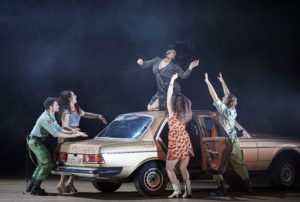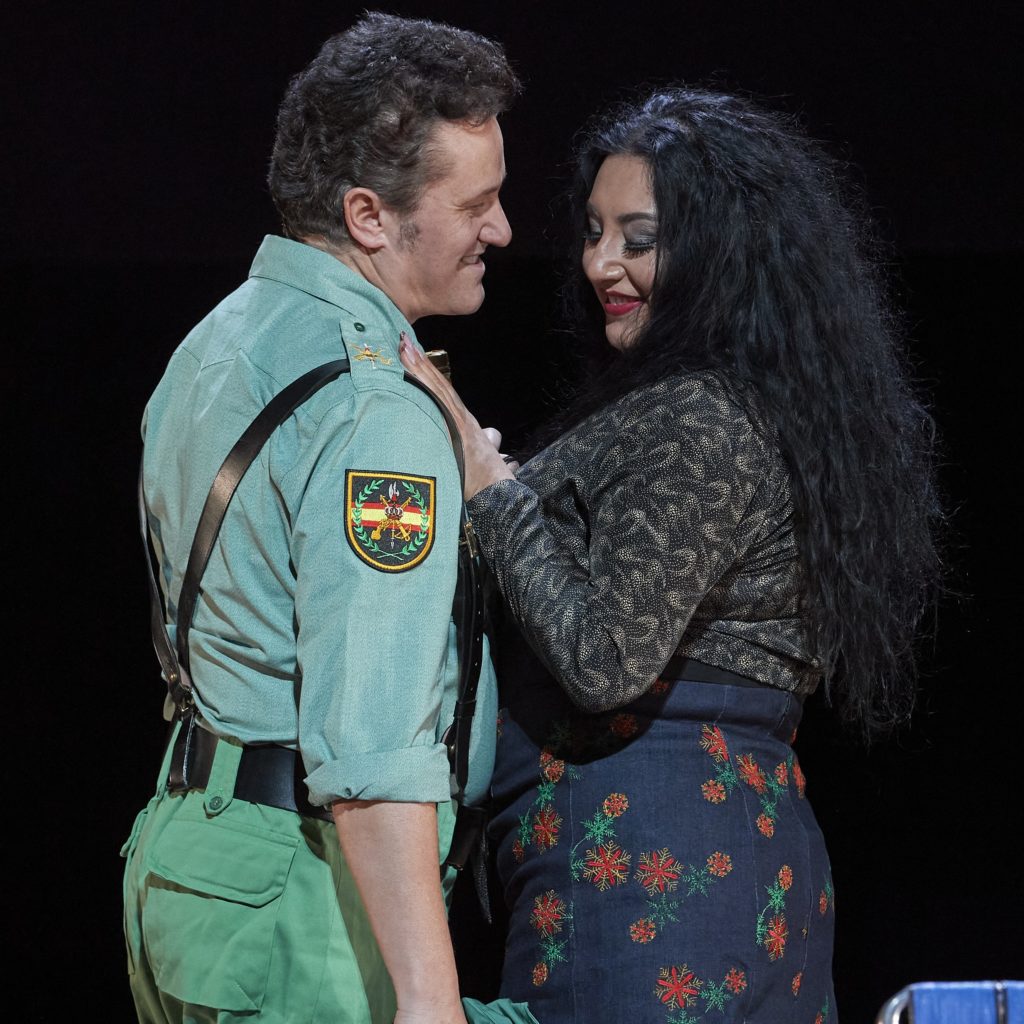Vienna State Opera’s new Carmen, with such a cast- Rachvelishvili, Beczala, Schrott, conductor Orozco-Estrada – who cares about the staging? Calixto Bieito’s Carmen was bound to be radical, modern, controversial. Set in north Africa, on the Spanish-Moroccan border, Bieito’s characters have ‘raw passion.’ But Bizet’s opera, with its exotic Spanish musical influences was radical for 1875 audiences: its subject ‘too immoral to be staged’, score (in-parts) ‘unplayable’. After Zeffirelli’s (1978) traditional ‘historical’ production, Bieito’s ‘concept’ is shocking, viscerally exciting, appealing to new audiences.
Soldiers lined up. Sergeant Zuniga (Peter Kellner) is muscular, lascivious. They mock her, Micaela, (Vera-Lotte Boecker), chic-in-pink. Who’s she waiting for? (Don José, she has a letter from his mother.) Zuniga insolently plays with his baton, like a phallic tool. He brutally handles her, but she throws him off, and she’s surrounded by randy, insulting soldiers. (A black runner has collapsed, exhausted.) The kids hold out their food bowls, behind them the changing of the guard. Soldiers sing, ‘expect the factory girls come whisper sweet nothings in their ear’. (One’s come out to have a smoke.) The women are sitting in their pastel, white uniforms. Behind them, soldiers’ chorus, provocative, louche, rubbing themselves. The girls are lying down in anticipation, paired-up.

Carmen enters, sings of fickle love, L’amour est une oiseau rebelle. Anita Rachvelishvili, powerhouse mezzo, massive charisma; big, but her body exudes sensuousness. In the Habanera, guys leaning on a telegraph pole, When will you love us?- Perhaps never. Soldiers at her feet, she strokes their heads, then pushed aside. She commands; now removes one guy’s shades. I love you even if you don’t love me. But if I love you then, be careful. (When you think you’ve caught the bird, it flies away.) She pushes them over, like toy soldiers. L’amour belongs to the wandering people, knows no laws. She pulls-off a man’s shirt; she tattoos his topless chest with her lipstick. Phew!
Don José (Piotr Beczala) is leaning against the flag pole. Carmen strokes her legs erotically with a flower; and casts it away! Now José picks it up.
Boecker, in her white mac, with bijou shoulder bag – auburn-haired, ‘the girl next door’- is mother’s choice, (hugged her leaving church.) Jose is respectable middle-class, the music is symphonic, melodiously safe, the lyrics nostalgic, remembering the past; his village, his mother, his homeland. But now Beczala sings of devils, his mother protecting him from danger. Beczala, no young soldier, but the most resplendent tenor, physically in shape.
Screaming co-workers fighting amongst themselves, pulling their hair out. José’s sent to investigate; Carmen has cut another worker’s face. But ‘burn me, chop me up’, she’ll say nothing. Répond! Zuniga demands. She’ll keep her secret, she sings; she loves another and will go to her death for him. A soldier, hands-bloodied, pulls off his belt. She’s held, restrained by José, who’s ordered to take her to prison.
In seguedilla, Carmen sings her heart is free, she’s a dozen suitors, but will tempt José, près des remparts de Seville. Beczala pushes her away. she shouldn’t talk to him. But Rachvelishvili’s Carmen, straggling black hair, is a sex-bomb. She intoxicates him. Will she keep her promise and love him? Now, Anita, with such high notes, Oui! She’s dancing around him. He lets her escape, himself imprisoned. (Love knows no laws!)
 Act 2. Sounds of car horns. Soldiers in a Mercedes, 1980s vintage, girls falling out of it. Frasquita and Mercédès, Carmen’s friends, look tarty in floral dresses. Rachvelishvili’s Carmen now in a blue/pink mini dress. She’s dangling her legs over the car roof. The scene is supposed to be Lillas Pastia’s tavern!? One soldier is mounting her legs; then she’s riding him. (‘Our instruments sound loudly.’) Now she’s brandishing a football scarf, like a matador’s cape. She’s boogying, swirling her hair in a frenzy.
Act 2. Sounds of car horns. Soldiers in a Mercedes, 1980s vintage, girls falling out of it. Frasquita and Mercédès, Carmen’s friends, look tarty in floral dresses. Rachvelishvili’s Carmen now in a blue/pink mini dress. She’s dangling her legs over the car roof. The scene is supposed to be Lillas Pastia’s tavern!? One soldier is mounting her legs; then she’s riding him. (‘Our instruments sound loudly.’) Now she’s brandishing a football scarf, like a matador’s cape. She’s boogying, swirling her hair in a frenzy.
Cheers for the Toreador. Escamillo enters in a troupe carrying live torches. In the Matador’s song, Erwin Schrott- in a navy suit, open-necked shirt- looks like a football manager! Gorgeously sung, Schrott’s bass-baritone exudes experience. And fabulous chorus (Vienna State Opera’s). Fire-torches lighten-up the darkened stage. ‘Suddenly there’s silence; the bull bursts forth.’ The guys are standing on the Merc, shaking its suspension. Carmen sings, ‘And remember (her) two black eyes are watching you!’
The Gypsies, North Africans, are planning a job. José has to throw his lot in. ‘If you have a scam, a theft is planned’, but, they sing, you can’t carry it off without a woman. They try to pull Carmen in. She refuses. The reason, she’s in love. Carmen, seriously?
José’s returned from prison, Beczala in uniform, beaming. She will dance in his honour. He’s sitting in the car, swigging, is it vodka? She wiggles, writhes, entices him. Such natural rhythm, sensuality, to the sound of castanets. She’s lying over the chassis in erotic poses, her fleshy legs astride. And she undoes Beczala’s shirt (he’s white-chested.) Bugle sounds, the last post. Back to his quarters! She’s been too stupid. She didn’t spare herself to be chaste. Ta-ra-ta-ta. Go my boy!- ‘Hard to leave, no woman has bewitched him so completely.’- Taratata, she taunts him, ‘that’s how much he loves her!’ Beczala, Rachvelishvili, make a sensational couple. He represents another way of life, she the exotic, uninhibited. 
Beczala sings, the flower she threw, he’d kept in prison; the scent remained. Anita lies provocatively on the ground. He blasphemes, but felt one hope, one desire, te revoir. Beczala’s glorious tenor epitomises French grand opera. Carmen, je t’aime! She challenges him. If he loved, he’d follow her- là-bas, into the mountains. Crime, contraband. The open sky, and, most beautiful, Freedom!
Bieito, (Ö3)interview, describes, travelling to Morocco, they’d found a field on the Spanish border, full of cars, Mercedes, second-third hand. Then saw people crossing, a traffic in everything possible, the crossing-point metaphorically at the frontier of mankind.
So, opening Act 3, women pushing limousines- that stage full of used Mercedes. ‘Listen buddy, there’s wealth waiting for us over there’, Chorus sing. But watch your step! José confronts Carmen. But she won’t be ordered around, wants her freedom.
Carmen, (with Mercédès, and Frasquita) playing cards on the bonnet, shuffles the tarot cards- ‘Me first, then him, but for both death.’ Mort. Rachvelishvili sings movingly, unsentimental: always the same answer. They’ll take care of the customs officers, like all the others, (like all men!)
Carmen’s adversary – Boecker still in cream raincoat- fingers her crucifix. She’ll be strong, deny her fear; confront the woman who tainted her love with sorcery. Boecker, stepped-in at short notice, sings magnificently, her lord will protect her.
‘Je suis Escamillo, torero de Granada’ Schrott (impressive, if lacking swagger) wanders into this smugglers’ mart, looking for his lover: ‘a Roma, her ex-lover a deserter.’ Beczala challenges him with a knife, Escamillo’s life’s saved only by Carmen’s intervention. He invites all to the bull fight; those who love him. Boecker’s Micaela, again tremendous, persuading Jose to return, his mother’s dying, without pardoning him. Beczala won’t let go, even if it costs his life. Carmen, cursed woman, you’re mine till we die!

Everything two pesetas! The crowd of spectators, brightly-coloured modern clothes, cheer. Vive Escamillo! Schrott, in full regalia, gold-embroidered. Carmen accompanying him, in tight-fitting scarlet satin, professes her love. Jose’s hiding in the crowds, she’s forewarned; fearless, she’ll talk to him.
Like Greek tragedy, on a barren stage, Beczala’s José,’not threatening, I’m begging you!’ Think of our past, Carmen, let’s start another life. – That’s hopeless, there’s nothing left between us!- Beczala, you no longer love me. She knows he’ll kill her, live or die, she’ll never give in. Born free, she will die free!
José, obsessed, he’s lost his soul’s salvation. Off-stage,’see how the angry bull rushes in!’ She holds her blood-stained hands up, collapses.
These are great performances, but- no audience, in lockdown – Vienna State Opera orchestra players ticked their bows: under Oroczo-Estrada, Bizet’s score re-enervated. A triumph!! A stage-filled cast- children, soldiers, women’s chorus- cheered and cheered. © PR 25.2.2021
Photos: Anita Rachvelishvili (Carmen); Peter Kellner(Zuniga), Anita Rachvelishvili,Szilvia Vörös (Mercéds), Slavka Zamecnikova (Frasquita); Piotr Bezala and Anita Rachvelishvili; Erwin Schrott (Escamillo)
© Wiener-Staatsoper/ Michael Pöhn

